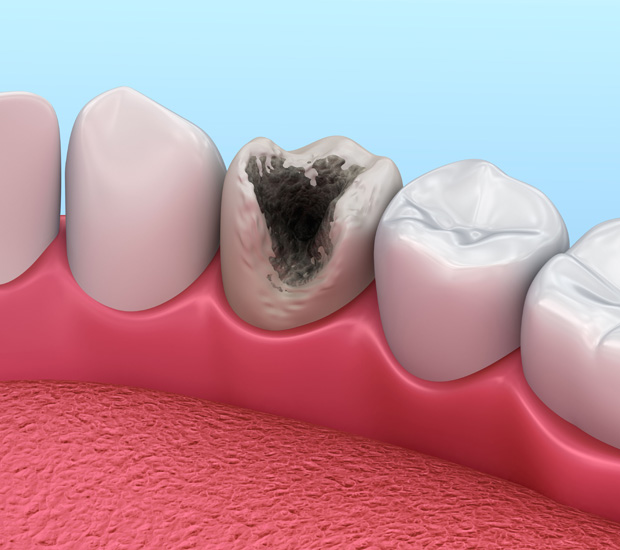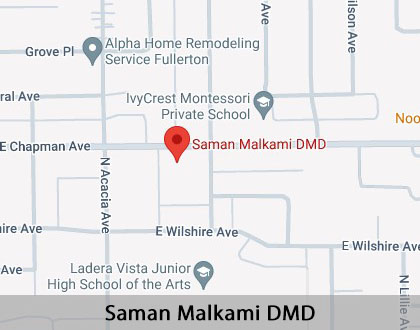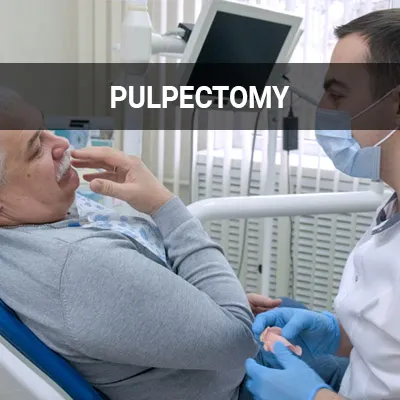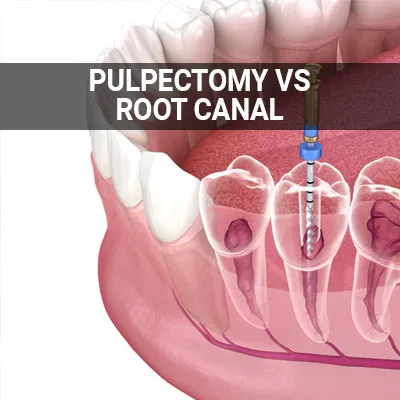Problems with Tooth Pulp Fullerton, CA
Tooth pulp — the soft center of the tooth — can be damaged when exposed to bacteria. This damage may be due to a cavity that extends deep into the tooth, an injury that exposes the pulp, or repetitive trauma, like teeth grinding. Pulp disease, or pulpitis, should be treated with endodontic or root canal therapy. Good oral health can help manage pulp disease, but a patient should see an endodontist right away if the tooth is injured.
Endodontic treatments for problems with tooth pulp are available at Saman Malkami DMD in Fullerton and the surrounding area. Our team offers a range of services, including root canal procedures. Call us at (714) 459-8002 to learn more.
Defining Tooth Pulp
The tooth pulp is the soft tissue found in the core of a tooth. The dental pulp contains the nerve, or root, and is full of tiny blood vessels, which nourish it as it grows. The root also anchors the tooth in the jawbone. Damage to the dentin or enamel layers of a tooth may expose the pulp to bacterial infection. Once this happens, the sensory function of the tooth may be impaired, and the tooth may become more susceptible to abscesses or fractures.
“Tooth pulp is the soft tissue found in the core of a tooth.”
Causes of Tooth Pulp Damage
Damaged tooth pulp is dangerous. Bacteria breed on dying pulp remnants, leading to an infection that can cause an abscess to form around the tooth's root. The best way to ward off a serious infection in the root canal is to avoid risk factors that threaten the dental pulp.
Common causes of pulpitis include:
- A cracked or broken tooth, exposing the pulp
- An injury like an impacted tooth or a tooth that gets nearly knocked out
- Cavities or tooth decay, causing erosion of the tooth
- Poor oral health from not brushing or eating a diet high in sugar
- Repetitive trauma from dental issues (chronic grinding or a misaligned jaw)
“The best way to ward off a serious infection in the root canal is to risk factors that threaten the dental pulp.”
Types of Tooth Pulp Diseases
Dental professionals can distinguish the type of tooth pulp diseases by specific diagnostic characteristics, which inform them on which endodontic treatment options will be most effective.
- Dental pulp calcification: (dental pulp stones): This refers to the hardening of the soft pulp tissue, which may compress adjacent nerves causing hypersensitivity and extreme pain. An endodontist can clear away dental pulp stones.
- Dental pulp exposure: Damage to the dentin or enamel-like cavities or cracks can expose the dental pulp, and infection can progress to an abscess requiring root canal treatment or extraction.
- Irreversible pulpitis: This refers to severely inflamed tooth pulp and is associated with intense pain. Irreversible pulpitis should be treated with a root canal procedure before the infection spreads to the gums or other tissue.
- Reversible pulpitis: This term describes a condition in which the tooth pulp is mildly inflamed, causing sensitivity or pain when eating or drinking something overly sweet, hot, or cold. This may be treated with good oral health habits.
“Irreversible pulpitis should be treated with a root canal procedure before the infection spreads to the gums or other tissue.”
Check out what others are saying about our dental services on Yelp: Problems with Tooth Pulp in Fullerton, CA
How an Endodontist Treats Tooth Pulp Damage
If pulp disease goes untreated, it can cause a severe infection that may spread to the gums or jawbone. Endodontists are dentists who specialize in treating tooth pulp. An endodontic or root canal treatment involves opening the tooth, removing the pulp, and cleaning and shaping the canal. The endodontist replaces the pulp with dental filler. At a follow-up appointment, the practitioner will place a permanent crown on the tooth for extra protection and to restore function.
“Endodontists are dentists who specialize in treating tooth pulp.”
Questions Answered on This Page
Q. What causes tooth pulp damage?
Q. What are the types of pulp disease
Q. How do endodontists treat pulp disease?
Q. How do you prevent pulp disease?
People Also Ask
Q. What can cause a tooth infection? What are the symptoms of a tooth infection?
Q. What happens during a pulpectomy?
Q. When would a patient need a pulpectomy?
Q. Why do endodontists perform root canals?
Preventing Tooth Pulp Damage
Patients are urged to protect their face and teeth when participating in activities that have the potential to cause dental injury. Those who grind their teeth at night should ask their dentist about a mouthguard to protect their teeth from repetitive trauma. In addition, people should practice good oral hygiene, including regular visits to the dentist. Everyone should brush their teeth twice daily, floss once daily, and consume fewer sugary foods and drinks. Those worried about pulp disease or who have experienced dental trauma should see an endodontist right away.
“Patients are urged to protect their face and teeth when participating in activities that have the potential to cause dental injury.”
Frequently Asked Questions
Q. If the pain in my tooth goes away, does that mean the tooth pulp has healed itself?
A. Many people mistakenly think a tooth pulp infection has healed on its own once the pain goes away. Nothing could be further from the truth. The absence of pain, in this case, means the nerves in the tooth have died, but the infection is still present and can spread to the rest of the body.
Q. Can antibiotics help treat a tooth pulp infection?
A. Though they may be used as part of the treatment for your tooth pulp infection, antibiotics alone will not cure a tooth pulp infection. Antibiotics can help, but they are usually used to complement an endodontic procedure. The most common antibiotics used for dental infections include amoxicillin, azithromycin, cefoxitin, metronidazole, and penicillin.
Q. What precautions will I need to take after the infected tooth has been treated with a root canal?
A. Right after the procedure, it is important to avoid eating until the numbness has worn off. Contact our team if you have an adverse reaction after the procedure, the crown or filling comes out, or you experience symptoms you had before treatment. It is also important to note that the treated tooth is now dead and more vulnerable to decay than before. The crown will provide some protection, but you will need to be strict about oral hygiene. A water pic or interdental brushes can be used to clean around the crown.
Q. How long does it take to treat a tooth pulp infection?
A. The answer to this question depends on your case. Typically, a root canal is the most common treatment, taking at least two hour-long visits. The endodontist removes the pulp and fills the tooth at the first appointment, and places the crown at the second appointment. This process can vary per patient and case. We can go over the specific details of your customized treatment process during an appointment.
Q. Is it better to have a root canal or just have the whole infected tooth removed?
A. It is the goal of endodontics to preserve natural teeth when possible. Natural teeth function better than artificial teeth. Also, having a root canal tends to cost less than extracting the tooth and replacing it.
Start Feeling Better – Visit Us Today
By visiting us as soon as possible, our team can help get you the professional treatment you need. Instead of waiting around and allowing the symptoms to get worse, we can provide you with treatment options.
Definitions
Learn More About Tooth Pulp and Oral Health
If the dental pulp is exposed or damaged, the tooth becomes vulnerable to severe bacterial infection. While poor dental hygiene contributes to deep decay, injury or trauma can also cause pulpitis. Endodontists are tooth pulp specialists, so make sure to seek endodontic therapy if you experience pain or hypersensitivity related to a tooth infection.
If you require endodontic care, let Saman Malkami DMD in Fullerton help. Call us at 714-459-8002 to learn more about our services and policies.
Helpful Related Links
- Cleveland Clinic. Pulpitis. 2024
- Healthline. What You Need to Know About Your Tooth Pulp. 2024
- Mayo Clinic. Tooth abscess. 2024
- Medical News Today. What to know about pulpitis. 2024
- Merck Manuals. Pulpitis. 2024
- News Medical Life Sciences. What is Pulpitis?. 2024
- Very Well Health. Tooth Pulp Function and Inflammation. 2024
- WebMD. What Is Pulpitis? 2024
About our business, license, and website security
- We accept the following payment methods: American Express, Cash, Check, Discover, MasterCard, and Visa
- We serve patients from the following counties: Orange County
- We serve patients from the following cities: Fullerton, Placentia, Anaheim, Anaheim Hills, Yorba Linda, Buena Park, Brea, Orange, Irvine, Tustin, Newport Beach, West Minister, Garden Grove, Whittier, Fountain Valley, and Long Beach
- CA (License #51168). View License Information and Specifics
- National Provider Identifier Database (1205909132). View NPI Registry Information
- Healthgrades. View Background Information and Reviews
- Norton Safe Web. View Details
- Trend Micro Site Safety Center. View Details
Back to top of Problems with Tooth Pulp










